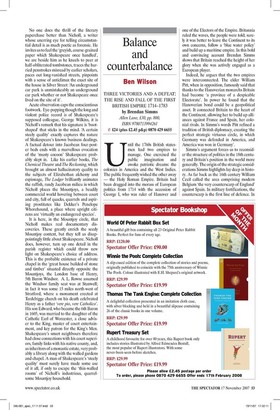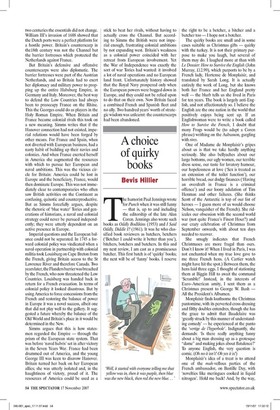Balance and counterbalance
Ben Wilson THREE VICTORIES AND A DEFEAT: THE RISE AND FALL OF THE FIRST BRITISH EMPIRE 1714-1783 by Brendan Simms Allen Lane, £30, pp. 800, ISBN 9780713994261 © £24 (plus £2.45 p&p) 0870 429 6655 Until the 1760s British statesmen had two empires to manage. One exercised the public imagination and awoke patriotic dreams: the colonies in America and the West Indies. The public frequently wished the other away — the Holy Roman Empire. Britain had been dragged into the morass of European politics from 1714 with the accession of George I, who was ruler of Hanover and one of the Electors of the Empire. Britannia ruled the waves, the people were told; surely it was better to leave the Continent to its own concerns, follow a 'blue water policy' and build up a maritime empire. In this bold and convincing account Brendan Simms shows that Britain reached the height of her glory when she was actively engaged as a European player.
Indeed, he argues that the two empires were interconnected. The elder William Pitt, when in opposition, famously said that thanks to the Hanoverian monarchs Britain had become 'a province of a despicable Electorate'. In power he found that the Hanoverian bond could be a geopolitical asset. It connected Britain to the heart of the Continent, allowing her to build up alliances against France and Spain, her colonial rivals. In Simms's words Pitt refined a tradition of British diplomacy, creating 'the perfect strategic virtuous circle, in which Germany was defended in America, and America was won in Germany'.
Simms's argument forces us to reconsider the structure of politics in the 18th century and Britain's position in the world more generally. The origin of the strategic considerations Simms highlights lay deep in history. As far back as the 16th century William Cecil called the area comprising modern Belgium 'the very counterscarp of England' against Spain. In military fortifications, the counterscarp is the first line of defence. In two centuries the essentials did not change. William III's invasion of 1688 showed that the Dutch ports were a perfect platform for a hostile power. Britain's counterscarp in the18th century was not the Channel but the barrier fortresses which protected the Netherlands against France.
But Britain's defensive and offensive counterscarps were also diplomatic. The barrier fortresses were part of the Austrian Netherlands, and so Britain had to exert her diplomacy and military power to propping up the entire Habsburg Empire, in Germany and Italy. Moreover, the best way to defend the Low Countries had always been to preoccupy France on the Rhine. This the Georges could do as players in the Holy Roman Empire. When Britain and France became colonial rivals this took on a new meaning. Simms writes that if the Hanover connection had not existed, imperial relations would have been forged by other means. For France and Spain, when not diverted with European business, had a nasty habit of building up their navies and colonies. And when France exerted herself in America she augmented the resources with which to pursue her European and naval ambitions. This was the vicious circle for Britain: America could be lost in Europe and the beneficiary, France, would then dominate Europe. This was not immediately clear to contemporaries who often saw British activities on the Continent as confusing, quixotic and counterproductive. But as Simms forcefully argues, despite the rhetoric of 'blue water' Tories and generations of historians, a naval and colonial strategy could never be pursued independently; they were utterly dependent on an active presence in Europe.
Imperial questions and the European balance could not be separated. In 1745 a forward colonial policy was vindicated when a naval operation in partnership with colonial militia took Louisburg on Cape Breton from the French, giving Britain access to the St Lawrence River and therefore Canada. Two years later, the Flanders barrier was breached by the French, who now threatened the Low Countries. Louisburg was handed back in return for a French evacuation. In terms of colonial policy it looked disastrous. But by using America to force concessions from the French and restoring the balance of power in Europe it was a novel success, albeit one that did not play well to the gallery. It suggested a future whereby the balance of the Old World and Britain's place in it would be determined in the New.
Simms argues that this is how statesmen regarded the Empire — through the prism of the European state system. That was before 'naval hubris' set in after victory in the Seven Years War. France had been drummed out of America, and the young George III was keen to disavow Hanover. Britain turned her back on her European allies; she was utterly isolated and, in the haughtiness of victory, proud of it. The resources of America could be used as a stick to beat her rivals, without having to actually cross the Channel. But according to Simms the British were not imperial enough, frustrating colonial ambitions by not expanding west. Britain's weakness as a colonial power coincided with her retreat from European involvement. Yet the War of Independence was exactly the sort of war Tories had wanted: it involved a lot of naval operations and no European land front. Unfortunately history showed that the Royal Navy prospered only when the European powers were bogged down in Europe, and they could not be relied upon to do that on their own. Now Britain faced a combined French and Spanish fleet and no ally. Two hundred years' worth of strategic wisdom was unlearnt: the counterscarps had been abandoned.





































































 Previous page
Previous page